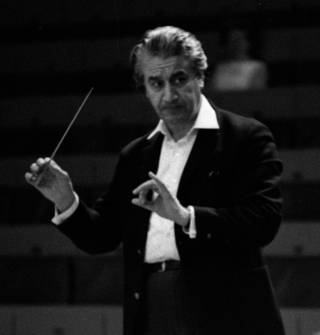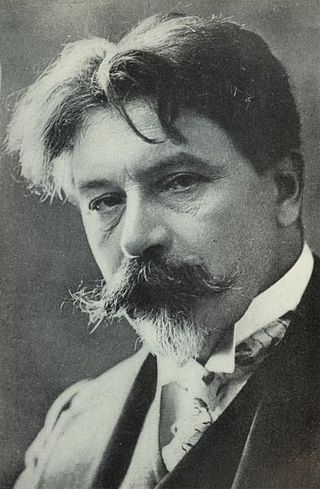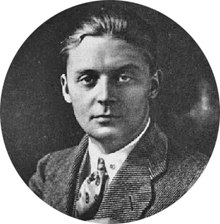
Gustav Heinrich Ernst Martin Wilhelm Furtwängler was a German conductor and composer. He is widely regarded as one of the greatest symphonic and operatic conductors of the 20th century. He was a major influence for many later conductors, and his name is often mentioned when discussing their interpretative styles.
The Berlin Philharmonic is a German orchestra based in Berlin. It is one of the most popular, acclaimed and well-respected orchestras in the world.

Conducting is the art of directing a musical performance, such as an orchestral or choral concert. It has been defined as "the art of directing the simultaneous performance of several players or singers by the use of gesture." The primary duties of the conductor are to interpret the score in a way that reflects the specific indications in that score, set the tempo, ensure correct entries by ensemble members, and "shape" the phrasing where appropriate. Conductors communicate with their musicians primarily through hand gestures, usually with the aid of a baton, and may use other gestures or signals such as facial expression and eye contact. A conductor usually supplements their direction with verbal instructions to their musicians in rehearsal.

Sergiu Celibidache was a Romanian conductor, composer, musical theorist, and teacher. Educated in his native Romania, and later in Paris and Berlin, Celibidache's career in music spanned over five decades, including tenures as principal conductor of the Munich Philharmonic, Berlin Philharmonic, Sicilian Symphony Orchestra and several other European orchestras. Later in life, he taught at Mainz University in Germany and the Curtis Institute of Music in Philadelphia, Pennsylvania.

Eugen Jochum (German:[ˈɔʏ̯ɡeːnˈjɔxʊm] 1 November 1902 – 26 March 1987 was a German conductor, best known for his interpretations of the music of Anton Bruckner, Carl Orff, and Johannes Brahms, among others.

Kurt Sanderling, CBE was a German conductor.

Arthur Nikisch was a Hungarian conductor who performed internationally, holding posts in Boston, London, Leipzig and—most importantly—Berlin. He was considered an outstanding interpreter of the music of Bruckner, Tchaikovsky, Beethoven and Liszt. Johannes Brahms praised Nikisch's performance of his Fourth Symphony as "quite exemplary, it's impossible to hear it any better."
Paul Godwin (1902–1982) was a violinist and the leader of a popular German dance orchestra in the 1920s and 30s.
The Symphonic Concerto for piano and orchestra in B minor by Wilhelm Furtwängler was composed between 1924 and 1937. Its world premiere took place in Munich on 26 October 1937, with Edwin Fischer as soloist; Furtwängler conducted the Berlin Philharmonic Orchestra. In January 1939 there was a radio broadcast which has survived as the only complete recording of the original version of the concerto.
Kirill Gerstein is a Russian-American concert pianist. He is the sixth recipient of the Gilmore Artist Award. Born in the former Soviet Union, Gerstein is an American citizen based in Berlin. Between 2007-2017, he led piano classes at the Stuttgart Musik Hochschule. In 2018, he took up the post of Professor of Piano at the Hanns Eisler Hochschule in Berlin in addition to the Kronberg Academy’s Sir András Schiff Performance Programme for Young Artists.
Harald Genzmer was a German composer of classical music and an academic.
Friedrich Wührer was an Austrian-German pianist and piano pedagogue. He was a close associate and advocate of composer Franz Schmidt, whose music he edited and, in the case of the works for left hand alone, revised for performance with two hands; he was also a champion of the Second Viennese School and other composers of the early 20th century. His recorded legacy, however, centers on German romantic literature, particularly the music of Franz Schubert.

Jan Lisiecki is a Canadian-born classical pianist of Polish ancestry. Lisiecki performs over a hundred concerts annually and has worked closely with the world's leading orchestras and conductors, his career at the top of the international concert scene spanning over a decade. He has been a recording artist with Deutsche Grammophon since the age of fifteen.

Guila Bustabo was a prominent American concert and recital violinist.

Hermann Zilcher was a German composer, pianist, conductor, and music teacher. His compositional oeuvre includes orchestral and choral works, two operas, chamber music and songs, études, piano works, and numerous works for accordion.
audite Musikproduktion is an independent classical music record label run by recording engineer Ludger Böckenhoff. Founded in Stuttgart in 1973, AUDITE merged with the Fermate label in 2000, relocating to Detmold in the process, where it is still based today. AUDITE Musikproduktion is an international provider of classical music sound carriers.
Kurt Graunke was a German composer and conductor. He was the founder of an eponymous orchestra that became the Munich Symphony Orchestra.
Walter Bransen, also Walther Bransen, was a German physician, violinist and composer. His pseudonyms were Will Rollins, Sam Fox and Karl Wetter.
Andreas Frölich is a German pianist and teacher at the Hochschule für Musik und Tanz Köln.

The Piano Concerto in F minor, Op. 114, is a concerto for piano and orchestra composed by Max Reger in Leipzig in 1910. He dedicated the work to Frieda Kwast-Hodapp, who premiered it in Leipzig on 15 December 1910 with the Gewandhausorchester conducted by Arthur Nikisch. The difficult composition has been rarely performed and recorded. Pianists who have tackled it range from the American Rudolf Serkin, who first recorded it in 1959, to Markus Becker who was the soloist in an award-winning recording in 2017.










